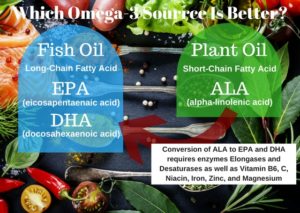There has been a long running controversy about fish oil or plant oil for heart health. And this  controversy has created confusion for the general public.
controversy has created confusion for the general public.
Why?
Because of your body’s need for essential fatty acids called Omega-3 fats. There are 3 of them:
ALA (alpha-linolinic acid) which is a short chain fatty acid from plants
EPA (eicosapentaenoic acid) which is a long chain fatty acid from Fish or Krill Oil
DHA (decosahexaenoic acid) which is a long chain fatty acid from Fish or Krill Oil
These fatty acids are considered essential because your body cannot make them. And they provide the following health benefits:
Improved Brain and Heart Health
Anti-Inflammatory to Lower Inflammation
Improved Digestion and Muscle Activity
Proper Cell Division and Membrane Integrity
Healthier Skin and Hair
Visual Acuity
Blood Clotting
Memory
Reduce Joint Pain
Lower Triglycerides
Improve Mood
That’s a nice list of benefits. So the question is:
Should you use fish oil or plant oil to get your needed Omega-3 fats?
To answer this question, and to bring clarity to this issue, I examine 5 of the best articles in this area to create the infographic below. And in the process discovered what would be the best choice for getting your essential Omega-3s.
Infographic for Fish Oil or Plant Oil For Your Omega-3s

Summary on Fish Oil or Plant Oil for Your Omega-3s
Hopefully the infographic above was helpful to you. However, let me summarize the positives and negatives for each choice. Then give you my recommendation for solving this controversy.
Plant Oil Summary: While plant based nutrition has other benefits, when it comes to providing the essential fatty acids EPA and DHA it’s a very ineffective. While manufacturers of these plant oils want you to believe that ALA can be converted the the essential EPA and DHA needs of your body, it just doesn’t happen.
And the reason why are several:
-
The high consumption of Omega-6 fats from Canola, Corn, Cottonseed, Soybean, Safflower, and Sunflower oils directly interferes in this conversation process. A hundred years ago this might not have been an issue when the ratio of Omega-6 to Omega-3 was between a 1 to 1 or even a 4 to 1 ratio. Today a typical America diet creates a ration of 20 to 1. This has lead to inflammatory health issues.
-
Two specific enzymes are need (Elongases and Desaturases), which are lacking in most people.
-
Other essential vitamins and minerals are needed in the conversation process like Vitamins B6, Niacin, Vitamin C, Iron, Zinc, and Magnesium. Most people today are extremely deficient in the mineral Magnesium.
Fish Oil Summary: Outside of heavy metal contaminates like Mercury this is the easiest and fastest way to consume your essential Omega-3s in the form of EPA and DHA. And while you can consume them from synthetic sourcing they are better absorbed into your body from fresh cold water fish that use good harvesting techniques.
The negatives to fresh cold water fish is cost, preparation, and taste.
Which brings us to Krill oil.
Krill Oil Is Your Best Source for Omega-3s
Believe it or not algae is a good source for your Omega-3s, which would make vegetarians and vegans happy. Krill are small crustaceans that feed on algae. While they would be in the Animal Kingdom they are the next step up on the food chain.
Specifically you would want Antarctic Krill because they have adapted to extremely cold water temperatures, which allows them to process EPA and DHA in unique ways that make these essential fatty acids more bioavailable for human consumption.
Krill oil is bound to triglycerides and phospholipids, which makes them easier to absorb. In fact some studies have shown Krill oil to be 48 times more potent than fish oil. Now you might be concerned about the triglycerides. But studies have shown that Krill oil helps to lower triglyceride and cholesterol levels because it improves metabolic function.
If your Krill oil is from certified Antarctic Krill, then you don’t need to worry about contaminates.
Krill oil has a potent antioxidant called astaxanthin that protects it from going rancid.
Krill oil contains phosphatidylcholine. Your liver adds this to fish oil so that it can be used by your body. Krill oil already contain this needed ingredient so it helps your liver while improving your body’s ability to use it.
Dr. Mercola has an excellent article about Krill oil and if you click here you can connect to it.
Then you can decide which is best for you: fish oil or plant oil or Krill oil.
Leave a Reply
You must be logged in to post a comment.